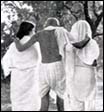'Gandhi is Defender of the Faith, and
Hindus across India recognise him as such'
 No such tangled analysis is necessary in respect to Gandhi's religious
mission in East Bengal. Here he is Defender of the Faith, and
Hindus across India recognise him as such. Witness the frequent
references to the well-known reformer, Shankar Acharya. This Hindu
saint of the eighth century reputedly walked barefooted to the
four corners of India in a pilgrimage to free Brahmanism from
the smothering embrace of Buddhism. When Hindus today draw analogies
between his march and Gandhi's, they demonstrate their fear that
Islam, too may be capable of a bear's hug.
No such tangled analysis is necessary in respect to Gandhi's religious
mission in East Bengal. Here he is Defender of the Faith, and
Hindus across India recognise him as such. Witness the frequent
references to the well-known reformer, Shankar Acharya. This Hindu
saint of the eighth century reputedly walked barefooted to the
four corners of India in a pilgrimage to free Brahmanism from
the smothering embrace of Buddhism. When Hindus today draw analogies
between his march and Gandhi's, they demonstrate their fear that
Islam, too may be capable of a bear's hug.
To the relief of one Noakhali village Gandhi sent a Muslim member
of his ashram, Miss Amtus Salam. She found the local Muslims still
acting aggressively toward their neighbors. In the Gandhian tradition
she decided not to eat until Muslims returned a sacrificial sword
which during the October upheaval had been looted from a Hindu
home. Now, a fast concentrates very heavy social pressure on its
objects, as Indians have long since learned.
The sword was never found. Possibly it had been dropped into a
pond. Whatever had happened, the nervous Muslim residents were
almost ready to agree to anything when Gandhi arrived in that
village on the 25th day of Miss Salam's fast. Her doctor reported
that life was ebbing. After hours of discussion (which reporters
said Gandhi took as seriously as the Cabinet Delegation negotiations)
Gandhi persuaded the village leaders to sign a written promise
that they would never molest Hindus again. Then he put the whole
issue into a capsule.
According to a report which I believe is the self-written authorised
version: "Gandhiji explained the significance underlying
the demand for the return of the stolen sword. What was being
demanded, he said, was freedom for the minority community to practice
their religion and worship their gods in any manner usual with
them, and freedom to pursue their normal avocations. Gandhiji
laid special emphasis on religious toleration. The essence of
Miss Salam's demand, he told the Muslims, was an assurance that
they would use all their influence to see that no member of the
Hindu community was obstructed from performing his religious rites
and worship in any manner he liked."
In other prayer talks Gandhi returned frequently to this theme.
People had told him, he stated one day, that if Muslims asked
Hindus to accept Islam if they wanted to save themselves or their
property, and if Hindus responded, there was no compulsion. What
Gandhi wanted to say, according to the approved report, "was
that this was acceptance of Islam under the threat of force. Conversion,
Gandhiji held, was made of sterner stuff. The statement reminded
him of the days when Christian missionaries, so called, used to
buy children in days of famine and bring them up as Christians.
This was surely no acceptance of Christianity. Similarly, the
acceptance of Islam, to be real and valid, should be wholly voluntary
and must be based on proper knowledge of two faiths: one's own
and the one presented for acceptance. This was the view Gandhi
had held all his life. He did not believe in conversion as an
institution."
Sincerely yours
Phillips Talbot
Kind courtesy: New India Digest, a journal to promote a better understanding of modern India. Readers who wish to subscribe to New India Digest may write to India Digest Foundation, Sahaydri Sadan, Tilak Road, Pune 411030.
|

